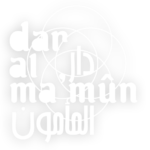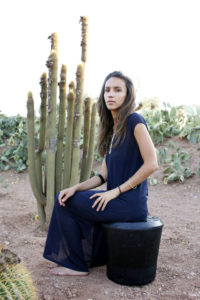 Holder of a diploma from the école Olivier de Serres in Paris, Sara Ouhaddou questions the availability of the design as a tool for the economic, social and cultural development. Born in France in a Moroccan family, her double culture improves her practice within a continuous movement. At first designer for several brand names, Lancôme among them, today she devotes mainly to her personal practice. Sara came to Dar al-Ma’mun in residence twice: the first time has allowed her to develop a mapping of skills available in the region of Marrakesh, and the second residence, coupled with the Tetouanese structure Trankat, saw the realization of several works developed in collaboration with various trades and craftsmen communities. The third time will allow her to finalize several works, including the creation of her company in Morocco.
Holder of a diploma from the école Olivier de Serres in Paris, Sara Ouhaddou questions the availability of the design as a tool for the economic, social and cultural development. Born in France in a Moroccan family, her double culture improves her practice within a continuous movement. At first designer for several brand names, Lancôme among them, today she devotes mainly to her personal practice. Sara came to Dar al-Ma’mun in residence twice: the first time has allowed her to develop a mapping of skills available in the region of Marrakesh, and the second residence, coupled with the Tetouanese structure Trankat, saw the realization of several works developed in collaboration with various trades and craftsmen communities. The third time will allow her to finalize several works, including the creation of her company in Morocco.
Joshua Craze [PAST]
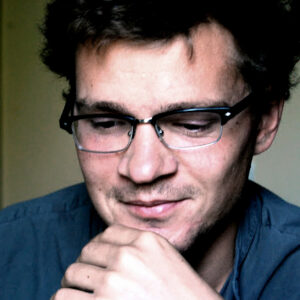 Joshua Craze is a British writer. He is currently working a novel, Redacted Mind , and a book under contract with the British publishers Hurst & Co., entitled Line Language: on the borders of the Middle East. He is also a Ph.D. candidate in anthropology at the University of California, Berkeley, where he is writing a dissertation on politics and ethics on the Sudan-South Sudan border, and a fellow at The Nation Institute for Investigative Reporting, where his work on American national security has led to a Senate inquiry. His reportage and essays have appeared in the British Guardian, the Washington Monthly, Onsite Review, and Fourth Genre, amongst others. His fiction has appeared in Annalemma and Hotel Amerika. With Mark Huband, he edited The Kingdom: Saudi Arabia and the Challenge of the 21st Century (New York: Columbia University Press/London: Hurst & Co).
Joshua Craze is a British writer. He is currently working a novel, Redacted Mind , and a book under contract with the British publishers Hurst & Co., entitled Line Language: on the borders of the Middle East. He is also a Ph.D. candidate in anthropology at the University of California, Berkeley, where he is writing a dissertation on politics and ethics on the Sudan-South Sudan border, and a fellow at The Nation Institute for Investigative Reporting, where his work on American national security has led to a Senate inquiry. His reportage and essays have appeared in the British Guardian, the Washington Monthly, Onsite Review, and Fourth Genre, amongst others. His fiction has appeared in Annalemma and Hotel Amerika. With Mark Huband, he edited The Kingdom: Saudi Arabia and the Challenge of the 21st Century (New York: Columbia University Press/London: Hurst & Co).
Safaa Fathy [PAST]
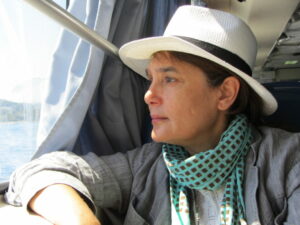 Safaa Fathy, born in Egypt, is a poet, filmmaker and essayist. She translated Derrida’s essay Le “concept“ du 11 septembre from French to Arabic. Her most recent films are Mohammad saved from the waters, Derrida’s elsewhere and a film poem Nom à la mer. Her last collection of poetry is Revolution, a wall we cross. In residency at Dar al-Ma’mûn, Safaa Fathy is now working on a movie project which starts from a poetic and visual rewrite of personal testimonies of people she met in Aghmat, a small town in the countryside of Marrakech. Website
Safaa Fathy, born in Egypt, is a poet, filmmaker and essayist. She translated Derrida’s essay Le “concept“ du 11 septembre from French to Arabic. Her most recent films are Mohammad saved from the waters, Derrida’s elsewhere and a film poem Nom à la mer. Her last collection of poetry is Revolution, a wall we cross. In residency at Dar al-Ma’mûn, Safaa Fathy is now working on a movie project which starts from a poetic and visual rewrite of personal testimonies of people she met in Aghmat, a small town in the countryside of Marrakech. Website
Manuela Morgaine [PAST]
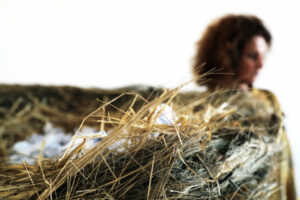
Manuela Morgaine is a writer, a theatre director, and a filmmaker living and working in Paris. She runs Envers Compagnie, which has been devoted to the production of interdisciplinary works since 1991. She is the author of three children’s books and several experimental radio documentaries broadcast on National French radio station France Culture. She has given her voice to numerous radio and film projects, and has directed several movies, including the four-part, four-hour long Foudre/Lightning (“Pathos Mathos”, “The Legend of Symeon”, “Baal”, and “Atoms”, 2004-2012).
She is currently working on ORAKL, a long-term project on the question of Oracles, involving research on oracular traditions all around the Mediterranean. The project will culminate in a book of oracular poems as well as an installation-performance involving a large sculpted door made out of ice acting the role of interactive oracle. As part of this project, Manuela Morgaine has already directed a feature-length documentary film titled Si une hirondelle ne fait pas le printemps, laquelle ?
Aisha Sasha John [PAST]
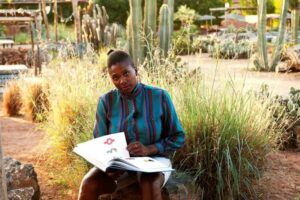 Aisha Sasha John is a dance improviser and poet living in Toronto. Her books include The Shining Material (2011) and the forthcoming THOU, to be published by BookThug in April 2014. Aisha’s dance background includes Caribbean folk dance and various Congolese and Ethiopian dances. She earned a B.A. in African Studies and Semiotics from the University of Toronto and an M.F.A. in Creative Writing from the University of Guelph. Aisha has been in Marrakech as a Unesco-Aschberg laureate artist at Dar Al-Ma’Mûn. In her current writing, Aisha Sasha John stages an exploration of the limits between poetry and spirituality that would not be achieved through religious invocation, or through a return to traditional literary forms. She would like to assert the experimental nature of her work, and her awareness of the modern avant-gardes, while at the same time yearning for a poetry worthy to be chanted. She draws inspiration from 20th century poetry, and also from music, in particular from West African musical traditions that she has studied over the years. In Morocco, she is getting more closely acquainted with Moroccan Gnawa music, which associates a poetics of chanting, and a practice of trance.
Aisha Sasha John is a dance improviser and poet living in Toronto. Her books include The Shining Material (2011) and the forthcoming THOU, to be published by BookThug in April 2014. Aisha’s dance background includes Caribbean folk dance and various Congolese and Ethiopian dances. She earned a B.A. in African Studies and Semiotics from the University of Toronto and an M.F.A. in Creative Writing from the University of Guelph. Aisha has been in Marrakech as a Unesco-Aschberg laureate artist at Dar Al-Ma’Mûn. In her current writing, Aisha Sasha John stages an exploration of the limits between poetry and spirituality that would not be achieved through religious invocation, or through a return to traditional literary forms. She would like to assert the experimental nature of her work, and her awareness of the modern avant-gardes, while at the same time yearning for a poetry worthy to be chanted. She draws inspiration from 20th century poetry, and also from music, in particular from West African musical traditions that she has studied over the years. In Morocco, she is getting more closely acquainted with Moroccan Gnawa music, which associates a poetics of chanting, and a practice of trance.
Ma’n Abu Taleb [PAST]
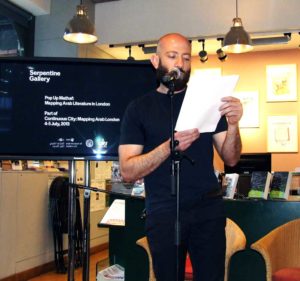 Ma’n Abu Taleb grew up in Jordan and now lives in London. He is a short story writer and several of histexts were published online, by Jadaliyya and Qadita as well as, in English translation, by ArteEast’s literary journal Shahadat. Ma’n also writes about music, and is a co-founder/editor of Ma3azef, an electronic magazine dedicated to the critique and analysis of contemporary and classical Arabic music.
Ma’n Abu Taleb grew up in Jordan and now lives in London. He is a short story writer and several of histexts were published online, by Jadaliyya and Qadita as well as, in English translation, by ArteEast’s literary journal Shahadat. Ma’n also writes about music, and is a co-founder/editor of Ma3azef, an electronic magazine dedicated to the critique and analysis of contemporary and classical Arabic music.
At Dar al-Ma’mûn, Ma’n Abu Taleb is exploring ways to tell an impossible story by using two languages (Arabic and English) simultaneously. In his own words:
“Some stories exist in areas filled with land-mines; linguistic, political, and ethical landmines. In this area, the same story, when told in Arabic, means one thing, and when told in English, means something entirely different. This area is values. Compelling literature, as I see it, is not about causes, not about human rights, not about identity and democracy and freedom. It is about the human condition, the mystery of existence, love, family, and death. It is the non-scholarly hermeneutics of being. What happens when a story, a good story, a story worth telling, is forced by its medium (language) into what it is not? How can one, in this day and age, when cultural front-lines are jagged and indistinct, write a compelling story with elements of gender, sexuality and violence, without being relegated into the genre of ʻidentity politicsʼ, or the even more limiting ʻliterature with a social messageʼ. I have been grappling with this murder story for over five years now. I have written it and rewritten it numerous times. It has been written in Arabic and English. It has been written as a short-story, as a novella, as a screenplay, and as a play. I now realize that this story cannot be told in any conventional format. This story requires new narrative mediums, a combining of them where the excess of meaning in each, is negated by another. It uses translation and back-translation, it shows subversion and distortion. This is a story that must exist between languages, and their respective systems of value. It has to exist between mediums and between forms. In order to survive the land-mines it faces at every narrative turn, the story needs to become a land-mine itself.“
